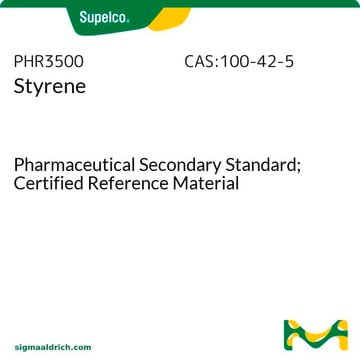45993
Styrene
analytical standard
Synonym(s):
Phenylethylene, Vinylbenzene
About This Item
Recommended Products
grade
analytical standard
Quality Level
vapor density
3.6 (vs air)
vapor pressure
12.4 mmHg ( 37.7 °C)
4.3 mmHg ( 15 °C)
autoignition temp.
914 °F
quality
stabilized
shelf life
limited shelf life, expiry date on the label
expl. lim.
6.1 %
technique(s)
HPLC: suitable
gas chromatography (GC): suitable
refractive index
n20/D 1.546 (lit.)
bp
145-146 °C (lit.)
mp
−31 °C (lit.)
density
0.906 g/mL at 25 °C
application(s)
cleaning products
cosmetics
environmental
flavors and fragrances
food and beverages
personal care
petroleum
format
neat
storage temp.
2-8°C
SMILES string
C=Cc1ccccc1
InChI
1S/C8H8/c1-2-8-6-4-3-5-7-8/h2-7H,1H2
InChI key
PPBRXRYQALVLMV-UHFFFAOYSA-N
Looking for similar products? Visit Product Comparison Guide
General description
Find all available reference materials for compounds listed in 10/2011 here
Application
Caution
Recommended products
Signal Word
Danger
Hazard Statements
Precautionary Statements
Hazard Classifications
Acute Tox. 4 Inhalation - Aquatic Chronic 3 - Asp. Tox. 1 - Eye Irrit. 2 - Flam. Liq. 3 - Repr. 2 - Skin Irrit. 2 - STOT RE 1 Inhalation - STOT SE 3
Target Organs
hearing organs, Respiratory system
Storage Class Code
3 - Flammable liquids
WGK
WGK 2
Flash Point(F)
89.6 °F - closed cup
Flash Point(C)
32.0 °C - closed cup
Personal Protective Equipment
Choose from one of the most recent versions:
Already Own This Product?
Find documentation for the products that you have recently purchased in the Document Library.
Customers Also Viewed
Our team of scientists has experience in all areas of research including Life Science, Material Science, Chemical Synthesis, Chromatography, Analytical and many others.
Contact Technical Service











